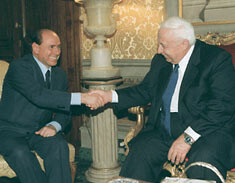The Electronic Intifada 18 December 2005

Javier Solana meets Israeli minister of foreign affairs Silvan Shalom, 15 September 2005. (Council of Europe, 2005)
The European Union threatened today to curb aid to the Palestinian Authority if Hamas wins next month’s Palestinian Legislative Council elections. EU foreign policy chief Javier Solana, following his recent shelving of a report critical of Israeli policies in Jerusalem, said during a visit to Israel and the occupied Palestinian territories that if Hamas won the elections, it would be “very difficult that the help and the money that goes to… the Palestinian Authority will continue to flow”.
The EU has a vested interest in the Palestinian Authority, which was allocated more than $340 million of aid money in 2005. However, the EU has also a vested interest in good relations with Israel. Relations between Israel and the EU have warmed recently, with Israel agreeing to allow EU representatives to monitor the crucial Rafah crossing between Egypt and the Gaza Strip.
Solana’s remarks come at a time when the EU backtracked on plans to publish a report highly critical of Israeli policy towards Palestinians in East Jerusalem. Leaked parts of the report accused Israel of sealing Palestinians in eastern Jerusalem from the West Bank as part of an overall effort to annex the city.
The report was drafted by diplomats in East Jerusalem and Ramallah to encourage foreign ministers of the 25-member group to take a more aggressive policy towards Israeli violations of Palestinian rights in Jerusalem. The report accused Israel of boosting settlements in and around East Jerusalem, and also of using the route of its Wall to sever most of East Jerusalem’s Palestinian residents from free access to the West Bank.
It was Javier Solana who persuaded EU ministers on December 12 not to endorse the report, warning that its publication could undermine the EU’s influence in the region. Germany and Italy were reported to have backed Solana’s view of the report as ‘one-sided’, while Nordic countries were reported to have argued in favour of transparency.
“There is a general election coming up in a few months’ time,” said British Foreign Secretary Jack Straw, whose country currently holds the rotating EU presidency. “So we thought it was appropriate not to endorse or to publish the document, but instead to continue to make representations about our concerns in the normal way.”
However, Solana’s remarks today highlights the EU’s inconsistency in its relations vis-a-vis the Palestinians and the Israelis. Citing Palestinian and Israeli elections as a reason to shelve the EU report on Jerusalem, Solana shows disrespect of the Palestinian political process by threatening to withdraw funds in the event that the opposition wins the elections.
With this, the EU continues to accommodate many of Israel’s illegal policies. A recent human rights assessment by the Euro-Mediterranean Human Rights Network (EMHRN) exposed a remarkable lack of coherence between the EU’s legally correct declarative diplomacy and its operative diplomacy in its relations with Israel. The EU is tending towards forging new “understandings” and “practical arrangements” with Israel and the Palestinian Authority at the expense of international humanitarian and human rights law and facilitates the disregard of this body of law by Israel.
The EMHRN report concluded that “the political echelon of the EU overlooks the necessity of ensuring respect for the rules of international humanitarian law to the construction of a viable and successful Palestinian state, and the achievement of respect for fundamental human rights throughout the region.”
As EI reported in March 2005, the EU has facilitated Israel’s violations of international human rights and humanitarian law by deferring to them in its own dealings with Israel. EMHRN concluded that the existing climate of general disrespect for the law by states has helped engender the growing problems of human insecurity, lawlessness and unregulated political violence observed within the occupied Palestinian territories, and may soon make the establishment of a fully sovereign and viable Palestinian state impossible.
EU missions
In a clear sign of close relations, Israel agreed to EU monitoring of the Gaza-Egypt border crossing, which opened last month. During his Israel visit this week, Solana will visit the Rafah border crossing. He will also visit the police headquarters of Gaza, in view of the launching in 2006 of another mission — EUPOL COPPS — which will monitor the Palestinian police.
Code-named “EU BAM Rafah”, the mission has been established on the basis of the “Agreement on Movement and Access” that was reached between Israel and the Palestinian Authority on November 15th. The aim of “EU BAM Rafah” is to bolster Israeli security control of people entering and leaving the Gaza Strip. It actively monitors, verifies and evaluates PA performance and acts to ensure that the PA complies with all applicable rules and regulations concerning the Rafah crossing point. The operational phase of EU BAM Rafah began on 25 November 2005 and includes 70 personnel from EU member states.
The European Union is preparing an “EU Police Mission for the Palestinian Territories” due to start on 1 January 2006. Code-named EUPOL-COPPS, this mission will support the Palestinian Authority in establishing for Israel suitable policing arrangements. The mission will closely monitor the Palestinian police. The mission will coordinate with other international actors, such as Egyptian intelligence and the CIA, as well as those providing support to the Palestinian Ministry of Interior. EUPOL-COPPS will include approximately 33 personnel primarily seconded from EU member states. The operational phase of the Mission will begin on 1 January 2006. EUPOL-COPPS will have an initial duration of 3 years.
Italy’s role
Diplomats said Italy was among EU member states which had argued against publishing the damning report about Israeli actions in Jerusalem. Italian foreign minister Gianfranco Fini said on December 12th: “On my initiative we discussed the political appropriateness of publishing the document on the situation in east Jerusalem.”
“At the end of the discussion,” he added, “we decided not to publish it because it was thought politically inopportune to make official a document which would appear at a time which is very different from when it was [originally] drafted.”
Not only is Italy governed by a pro-Israeli cabinet. Recently, former finance minister Benjamin Netanyahu said he was offered the position of finance minister in Italy, but rejected it. Netanyahu revealed that Carlo de Benedetti, one of Italy’s leading industrialists has offered him the post, but that he declined and opted for staying in Israel. Interestingly, the EU border mission in Rafah is headed by an Italian, Major-General Pietro Pistolese.

Benjamin Netanyahu with Silvio Berlusconi

Silvio Berlusconi with Ariel Sharon
The European Voice, a Brussels-based weekly newspaper specialized in EU affairs, reported that “Israeli diplomats have warned that relations may be soured if the report was published.” According to The Guardian, one EU diplomat said the report was “a little much”. “Javier Solana made clear he thought it was very one-sided and unhelpful,” the diplomat added.
“As everyone knows, Israel and the Palestinian territories [sic] are on the eve of election campaigns which in both cases will have an enormous impact on consolidating the peace process… For this reason it appeared to my [European Union] colleagues that the publishing of the document could be exploited by those.. who have different objectives from those defined by the Road Map [peace process],” Fini said.
Instead of severing ties with Israel, as Israel’s conduct in terms of human rights and international law requires, the EU prefers to make the most significant upgrade of its ties with Israel in a decade. In the EU’s operative diplomacy, it has failed to satisfy the obligation to refrain from facilitating Israel’s violations of international law through deference or acquiescence.
In the interest of preserving and expanding its privileged relations with Israel, in several notable instances the EU has violated this obligation with conspicuous intent. The EU can not knowingly allow its contractual relations with any third country to carry on in this manner without itself violating EU law and international humanitarian law.
Arjan El Fassed is a cofounder of the Electronic Intifada
Related Links





